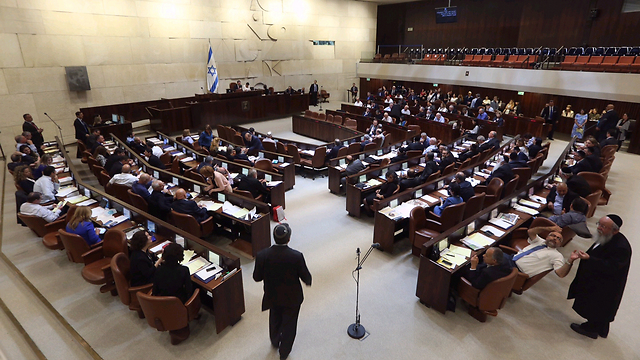
Controversial bills on agenda as Knesset returns for summer session
With a broader coalition, the prime minister can now push his MK suspension bill forward, while the justice minister can promote her NGO transparency bill and the Haredi factions can use legislation to combat libel Jewish sects.
The final days of the parliament's hiatus were dedicated to efforts to expand the government. Assuming no last minute changes occur, the Yisrael Beytenu party is expected to join the coalition, increasing the number of voting hands at Prime Minister Benjamin Netanyahu's disposal from 61 to 66.
This means the prime minister will no longer be dependent on a one-vote majority, stopping any errant MKs in the coalition from paralyzing its legislative activity.
The Knesset's winter session was longer than usual due to the Hebrew leap year. As a result, the legislators had plenty of time to push controversial bills that, after beginning the legislative process during the winter session and causing a public outcry, will continue the process now and once again be on the public agenda.
These bills, proposed by the right wing, are expected to receive more support after the coalition expands to include 66 members.
The suspension bill, which was proposed after MKs from the Balad faction met with terrorists' families, seeks to allow the Knesset to suspend one of its members. Prime Minister Benjamin Netanyahu announced at the time that the bill will be passed in a quick process, but it has since only passed one of the three votes it needs to be made into law. The bill is now expected to go up to a vote a second and third time during the summer session.
Another controversial legislation expected to come up during the summer session is Justice Minister Ayelet Shaked's (Bayit Yehudi) NGO transparency bill, which requires NGOs that get the lion's share of their budget from foreign nations to publicly announce this in every publication. The bill passed a first vote and will now continue its legislative process.
A similar proposal is the "V-15 bill" raised by MK Yoav Kish (Likud), which seeks to prevent non-parliamentary NGOs from aiding candidates running for Knesset, just as the V-15 NGO aided Zionist Union leader Isaac Herzog in the last elections, even though it never specifically named him or specifically called to elect him. The bill received the approval of the ministerial legislative committee during the last session and is now expected to come up for a preliminary vote.
A bill proposal on religion and state that raised ire during the previous session is the Shabbat bill, proposed by MK Miki Zohar of the Likud party, which seeks to bar commerce altogether on Saturdays—even at cafes, restaurants, movie theaters and other businesses that have been operating on Shabbat under the status quo. The bill was approved by the ministerial committee for legislation, but has yet to be raised for a preliminary vote at the Knesset.
United Torah Judaism MK Moshe Gafni's mikveh bill, which seeks to prevent Reform and Conservative Jews from using public mivkehs (Jewish ritual baths) in their conversion process, is also still at the ministerial committee level. The Knesset's ultra-Orthodox parties are also expected to oppose the government decision to open a mixed prayer area at the Western Wall for the liberal sects of Judaism.
Another possibly controversial bill seeks to change existing legislation that detracts state funding from ultra-Orthodox educational institutes that don't teach core curriculum subjects like math and English. When the government was formed, the Haredi parties demanded to amend the legislation as part of their coalition agreements and now, despite his objection, Education Minister Naftali Bennett will have to push the amendment.
Musical chairs in the Knesset
The Knesset will see several changes in its makeup in the coming summer session. Former defense minister Moshe Ya'alon has resigned from the Knesset and will not be back for the summer session, while Yisrael Beytenu MK Orly Levy-Abekasis quit the faction, making her the Knesset's only independent MK.
Concerns that Likud MK Benny Begin will also seek to quit either the faction or the Knesset altogether—after he criticized the coalition deal taking shape with Lieberman—have been ameliorated as officials say Netanyahu is expected to appoint Begin a minister and thus acquiesce him.
Meanwhile, negotiating teams from the Likud and Yisrael Beytenu parties are working to finalize the details of the coalition agreement between them. Finance Minister Moshe Kahlon will meet with slated defense minister Avigdor Lieberman and Tourism Minister Yariv Levin at 10am to try and iron out the details of the pension reform for new immigrants, one of Yisrael Beytenu's conditions to joining the government, and the necessary budget for it.
Negotiating teams are also working to formulate a draft for Yisrael Beytenu's flagship death sentence to terrorists bill. This bill could face obstacles from within the coalition after Kahlon'sKulanu party said Sunday it would object to it.
But Kahlon's objection to the legislation will likely not affect coalition negotiations, as Lieberman's demand is expected to only focus on making a minor amendment to the military law, which already has the authority to sentence terrorists to death.
Officials involved in the talks say the sides are expected to resolve the remaining issues and then sign the agreement on Monday. If all goes according to plan, Lieberman will be sworn in as the defense minister while close ally Sofa Landver will be sworn in as the immigration absorption minister on Tuesday.
During the hiatus, the Knesset building underwent massive renovations, which included the upgrade of several elements in the plenum hall, with administrative employees working into the night on Sunday to test the upgraded electronic voting system.











